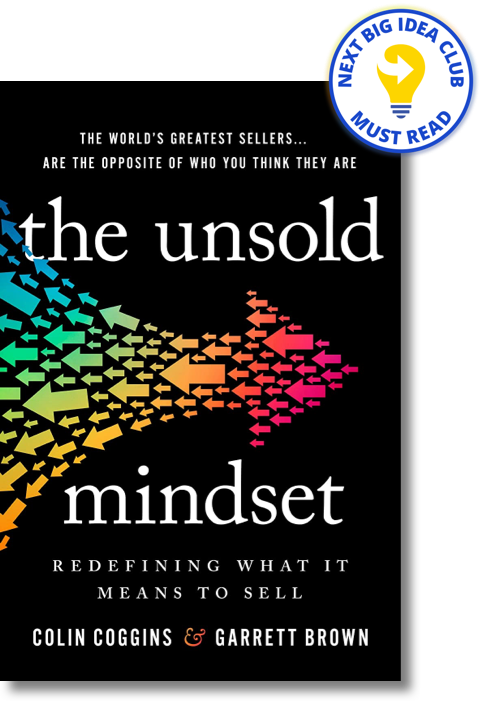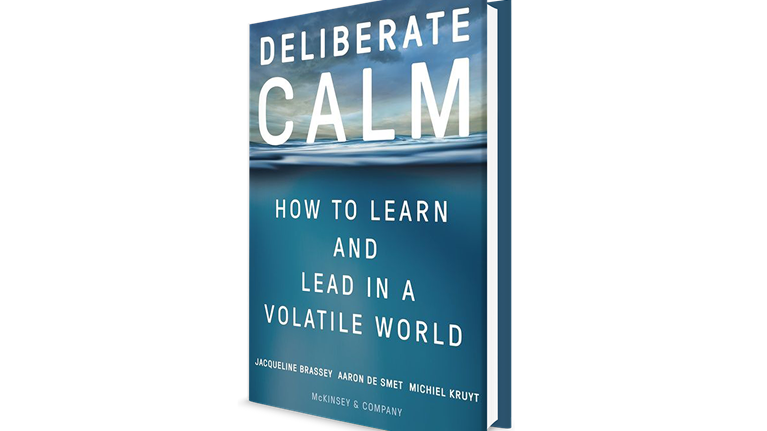In this edition of Author Talks, McKinsey Global Publishing’s Vanessa Burke chats with University of Southern California (USC) adjunct professors Colin Coggins and Garrett Brown about their new book, The Unsold Mindset: Redefining What It Means to Sell (HarperCollins Publishers, February 2023). From “pathological optimism” to “intentional ignorance,” Coggins and Brown share the mindsets used by the world’s best sellers to connect with people authentically and turn customer interactions from transactional to transformational. An edited version of the conversation follows.
Why did you write this book?
Garrett Brown: It started with our class. We teach sales mindset for entrepreneurs at USC. We’ve been teaching that for almost five years now, and we created that class because it’s the class we wish we had had when we were 20 years old—when we were starting out—and even the class that we wished we’d had along the way.
We realized that we were learning all of these things as we were creating the curriculum and as we were doing research for the students and figuring out what we were going to teach. We realized that so many people weren’t getting access to the things that we had been learning. We realized that if we wanted to make the change that Colin and I want to make in this world, we needed more people to learn about the things we were learning about. We thought that a book would be a great way to do that.

Colin Coggins: We found that the stereotype around sales and salespeople was so pervasive that you could ask anyone, “What do you think of when you hear the word salesperson?” and they would say, “Yucky, manipulative, pushy, smarmy,” but that wasn’t our experience.
Sales had changed our lives. When we were selling, people were thanking us; there were real relationships and real growth. When Garrett and I got together, we decided very firmly on day one that we were going to change the way that the world viewed sales and salespeople by changing the way that these people viewed themselves. I think the biggest impact that we could make was writing a book at scale to change the way that people viewed the relationship between salespeople and the people who are being sold to. That was really big for us.
What are some ways a salesperson can avoid a cycle of inauthenticity?
Colin Coggins: The greatest salespeople on the planet are not the most gregarious. They’re not the most sociable, but they are the most socially aware. They can realize mid-sentence that they said something, and it didn’t land—they’re present and capable of changing that narrative in real time. They’re not these extroverts who are so self-confident, but they are self-aware.
When you think about this vicious cycle of inauthenticity, the first thing is awareness. During COVID, Garrett and I had so much access to tons of hours of recordings. We were listening to these salespeople who were typically underperformers—they weren’t doing well—but during COVID they were great. Then, we saw this group that typically was really good—they were thriving pre-COVID—and as soon as the lockdown hit, they started underperforming. We said, “Why is this? What’s happening?” And here’s what happened: for the group that historically underperformed but that performed high during COVID, all of their conversations started almost the same way.
They would say, “I have no idea if we should even be having this conversation right now. This is very weird. This is my first pandemic, too, but I know that you accepted this calendar invite, and we have a job to do, so we’re going to do it.” You would see this reciprocation of love from the customer on the other end. They would say “Thank God you said that. This is so weird.”
When you think about a way that a salesperson can mitigate inauthenticity, rule number one is to be aware. Give yourself permission to be authentic and be aware that the world will give you credit for your flaws, that the world will give you credit for being just like the person you’re talking to, who is imperfect. Inauthenticity is rooted in someone who’s trying to seem like they’re better than they are, but that’s not actually what we want. Those aren’t the expectations, and there’s a real disconnect between that.
Garrett Brown: The short answer, from the science that we dug into as we were writing the book, is to label it. Realizing that it’s happened, and label it in real time.
We have this mantra that we teach in our class and that we teach to our clients all the time. We say that if you think you sound like you’re being cheesy, then you’re probably being cheesy. A corollary to that is, if you think you sound like you’re being inauthentic, you’re probably being inauthentic.
Acknowledging those moments—when the little voice inside of your head is saying, ‘I’m not being my most authentic self right now. I feel like I’m selling, or I feel like I’m pushing too hard’—acknowledging that, labeling it, that’s the first step.
Acknowledging those moments—when the little voice inside of your head is saying, “I’m not being my most authentic self right now. I feel like I’m selling, or I feel like I’m pushing too hard”—acknowledging that, labeling it, that’s the first step. From there, you can start to address the cycle and make the changes that you need to make.
Can you teach the average person to be a great salesperson?
Garrett Brown: We absolutely believe that. The good news is the reason we take a mindset approach to selling as opposed to a tactical approach: there’s a lot of places that you can go, and you can learn how to build rapport, handle objections, and do the day-to-day tactical approach to selling, but not a lot of people are talking about how you think.
Emotional intelligence grows as we get older because it’s based on experience and it’s based on communication and interaction with other people. As we started to write this book and put our curriculum together, we started to have conversations with all of these amazing sellers, with and without sales in their title.
We talked to everybody from CEOs and founders to doctors and lawyers and artists and hypnotherapists and everything in between. We realized that they all had things in common. A lot of the things that they had in common—and a lot of the things that we talk about in our class, in our book, in front of our audiences—are all things that are related to emotional intelligence and mindset and things that can absolutely be taught and developed over time.
We talked to everybody from CEOs and founders to doctors and lawyers and artists and hypnotherapists. A lot of the things that they had in common . . . are all things that are related to emotional intelligence and mindset.
Colin Coggins: A third of our class shows up every Monday night not to sell products or services but to learn how to sell themselves. They want to get the job, they want to get promoted, they want to build relationships. Another third of the class shows up every Monday because they want to learn how to sell ideas. They want to be leaders. They want to be marketers. They want to be entrepreneurs. Then, you have a third that wants to sell products and services. When you look at the makeup of the class, it’s representative of the makeup of the greatest salespeople on the planet.
Can you teach someone to be great at sales if everyone sells? We interviewed chef Roy Choi, who is such a proud introvert, and we interviewed so many introverts after him. They’re some of the greatest salespeople in the room, not because they’re know-it-alls, not because they’re knowers, not even because they’re confident. It’s because they rarely speak, so when they do, people listen.
They say sellers are known for asking great questions. What we found is that it wasn’t that they had great questions; it’s that they were thinking about the people that they were asking questions to differently. They cared differently. They asked questions that people had never thought of the answers to before. These people are ideating for the first time in real time, and whatever that answer is, it’s their answer.
They weren’t being sold. They weren’t stripped of their agency. They felt like they were part of the process. To answer your question, do we think that anyone—if everybody sells—can be taught to sell, the short answer is yes. But the long answer is, it’s probably not a conversation about adding. It’s a conversation about stripping away. The problem with salespeople, when they get into a selling situation, is that they try to be perfect. What if you showed up as the same person you were at the bar the night before?
When should a salesperson use what you call ‘intentional ignorance’?
Colin Coggins: The best way for anyone to think about intentional ignorance is that great salespeople don’t know it all, intentionally. They create this infrastructure so that they can’t show up inauthentic. A lot of that has to do with not forcing yourself to learn parts of the process that don’t give you energy, that you know you’re going to show up and act like you enjoy talking about it.
The reality is, you’d be way better off if you said, “I don’t know, but I do know someone smarter than me who does,” or “I don't know, but let me go find out for you.” Customers are giving people more credit for being resourceful than they are for having every single answer. Because if you have every answer, you strip the agency away from people, and people start saying no to you just because you’re right, not because you’re wrong.
Garrett Brown: There’s another huge advantage to being intentionally ignorant on top of all the great things that Colin just said, which is that you move differently when you are talking about something that you’re excited about. You’re more passionate about it. You’re more enthusiastic. You’re asking better questions and listening to the answers more intently because you want to teach the other person about it.
A big thing that Colin and I talk about is maximizing the time doing what you would do for free and understanding that you get paid for all the rest. All of these unsold sellers, people with an unsold mindset, they’re finding a way to focus more on the things that they would do for free.
Given current global challenges, which of the unsold mindset practices should companies embrace to foster resilience?
Garrett Brown: Resilience is such a good one. We spent a lot of time, as we wrote this book, digging into studies on neuroscience because there is a lot of overlap between neuroscience and the most resilient people. One of the things that we found over and over is that the brain finds what it’s looking for. If you look for the good you’re going to find the good, and if you look for the bad you’re going to find the bad.
There’s a concept that we teach relentlessly, and we call it celebrate the process. What we mean by that is not just celebrating the wins and the sales that you make and the achievements that you accomplish but actually celebrating the lessons along the way too, celebrating when you get the “no,” because now you can go back and look at what went wrong, what you did and, more importantly, what you could do differently next time.
Celebrate the process. What we mean by that is not just celebrating the wins . . . [but also] look at what went wrong, what you did and, more importantly, what you could do differently next time.
You celebrate that. We talk about celebrating the process, and we mean every detail of the process. We talked to someone at a company, and the entire sales team had what was called a hang-up hangout.
Basically, it was a sales team. A lot of folks were on the phone doing cold-calling and different types of calls all week long. Every Friday, they got the team together and they celebrated the most obnoxious, ridiculous, crazy times that people got hung up on—not the sales from the week. Then they would spend time talking about it and, yes, laughing about the funny ones, but also trying to examine what happened and what went wrong in those so that they could then learn from those and not make those same mistakes next time—so that instead of getting hung up on, they have a better opportunity to have a conversation with somebody they can help.
When you’re talking about resilience, I think looking for the good, celebrating the process, and realizing that what the brain looks for it typically finds more of is a really important lesson that we learned from the people we spoke to. That carries over and would absolutely change the game in terms of resilience.
Colin Coggins: One of the most fascinating parts of the research process for us was around learned optimism. We have a chapter titled “Pathological Optimism.” My wife gave me that title, and it was not a compliment when she gave it to me. Garrett made sure that that’s very obvious in the book because toxic positivity is real.
This idea around learned optimism is that you continually believe that as long as you persist and work hard at something, eventually—who knows when, but eventually—you will prove yourself right. We have found that in almost every interview that we’ve ever had, people are not too concerned about when they’re going to get it right; they just know that eventually they will. Now, it doesn’t always look like how they planned it to be.
If you’re teaching somebody anything around resilience . . . I would say teach learned optimism—look backward. It does get better. It’s not going to be easy, but there’s data that will prove that if you continue, progress does actually persist.
If you’re teaching somebody anything around resilience, when it comes to this global climate, I would say teach learned optimism—look backward. It does get better. It’s not going to be easy, but there’s data that will prove that if you continue, progress does actually persist.
Which method of developing an unsold mindset do you enjoy teaching the most, personally, and why?
Garrett Brown: Which is our favorite thing to teach? You’re asking us to pick our favorite child. One of the mindset characteristics that we talk about in our book is this idea of falling in love with the person you’re going to talk to. Again, not to sound like a broken record, but you act differently when you actually care about somebody, when you’re interested in them, when you want to know more about them, and when they’re not just another number or name on a list of people you have to talk to.
If you make this simple mindset shift, it’s going to change the way that you interact with people. As an example, one of the ways that we teach it—it’s really simple and something that anybody watching or reading about this can give a shot themselves—is that we talk about this idea of a “love three-by-three.”
We say spend three minutes before any call or any conversation finding three things that you love about the person you’re going to talk to. And we mean love. Go on their LinkedIn or other social media profiles or on the company website and find things that you love.
Colin Coggins: The whole baseline of the book is that if you look for the good, you’ll find it. If you want to be a great salesperson, people are looking for the good in you. People are looking for the good in your product or your service or your ideas; that’s what’s happening. That does not occur unless you are also looking for the good.
What I love most about teaching some of these core concepts in the book is to shine a light on the incongruence between who people think salespeople are and who they think great salespeople are.
In every single keynote, every class, every interaction, we ask people, “What do you think of when you hear the word salesperson?” They say these yucky words, and then we say, “OK, who’s the greatest salesperson you know?” We’ve asked that thousands of times. The two most popular answers are Martin Luther King Jr. and Steve Jobs. I love the look on people’s faces when I don’t say anything. I pause and then say, “So, wait, you just said that when you hear the word salesperson you think smarmy, yucky, manipulative. And then when I asked you who the greatest salesperson is in the world, you said your son? You said Steve Jobs. You said Martin Luther King Jr.”
[When] we say, ‘OK, who’s the greatest salesperson you know?’ We’ve asked that thousands of times. The two most popular answers are Martin Luther King Jr. and Steve Jobs.
It’s so obvious that the greatest salespeople on the planet are the exact opposite of whom people think salespeople actually are. If we do our jobs right in class and in keynotes and in this book, what we’re actually teaching is, don’t waste the best part of the movie being someone you’re not. That’s not who we want you to be.
What are some of the unsold mindset practices you have seen bring transformational success?
Colin Coggins: We had an account executive who was brand-new, and he was being labeled as a lead-hoarder by the number one salesperson in the room. She actually came up to me and said, “Hey this guy’s coming in early; he’s taking all the hot territories, and he’s putting them in the CRM [customer relationship management] before anybody gets here.”
I bring him in the room, and I say, “Hey, listen, I want to have a conversation with you,” and he sits down on this couch. As I’m opening my mouth to say, “So what I heard was,” he starts shaking his butt back and forth on this couch. It’s a nice couch; it’s a Restoration Hardware couch. I said, “What are you doing?” He says, “This is a really nice couch.” I said, "OK. Here’s what I want to talk to you about.”
He stands up in the middle of me talking, flips the couch cushion over, figures out who makes it, puts it down, sits back on the couch, opens up his laptop like I’m not even there—true story—goes on LinkedIn, finds the company, and goes, “They have five thousand employees. They’re definitely using CloudApps. Do you care if I prospect into them later?” I said, “No, I don’t mind at all.” And then he said, “OK, so, what do you want to talk about?” And I said, “Absolutely nothing.”
It is very hard to teach people about the nuances of abundance and scarcity. One of the most important lessons that we can teach in our class and in this book is that there’s an abundance—we call it “abbondanza.” There’s so much opportunity everywhere, but you’re so narrowly focused that you can’t see anything except for what’s in between the blinders.
It’s a really hard thing to teach. But by the end of the semester and by the end of the book, we hope that people see opportunities in places that they never would have before. If this dude can find deals in couch cushions, the sky’s [the limit]. By the way, he turned out to be our number one salesperson because he would look for deals in places that no one would look for.
Garrett Brown: Identifying a purpose and then tying that purpose to your goals, that is a transformational practice. Realizing that if you fall in love and change the way that you interact with people, it’s going to have a different impact—that is transformational.
I think just to give something new here and to play off the word transformational, we have an entire chapter in our book about the fact that we realized that all of these people we were talking to were thinking “transformationally” as opposed to transactionally.
Identifying a purpose and then tying that purpose to your goals, that is a transformational practice.
When they’re selling—whether they’re selling themselves or their ideas or their products or their services—they’re not just thinking, “OK, this is a transaction. I’ve got to go talk to this person, and I’m going to sell them on it, they’re going to give me the money, and then it’s over.” They were literally thinking about how they can transform this person or this relationship or this situation in a different way.
Colin mentioned earlier that we interviewed chef Roy Choi, and he is famous for building the food truck revolution with his Kogi trucks here in Los Angeles. He had to sell customers on a different experience in dining, where you don’t have to go into a restaurant and then go sit at a table. You can go out somewhere, wait in line outside at a truck, buy something, and have just as transformative of an experience. The one that really landed the most with me was that he wanted to transform the entire industry.
I love that example as somebody who could’ve easily thought transactionally and said, “I’m going to sell a bunch of tacos outside somewhere and that’s it. And I’m going to make a bunch of money.” He was thinking, “How do I transform an entire landscape, the entire restaurant industry, to become something that I think it can be?” To be transformational, you have to think transformational.


